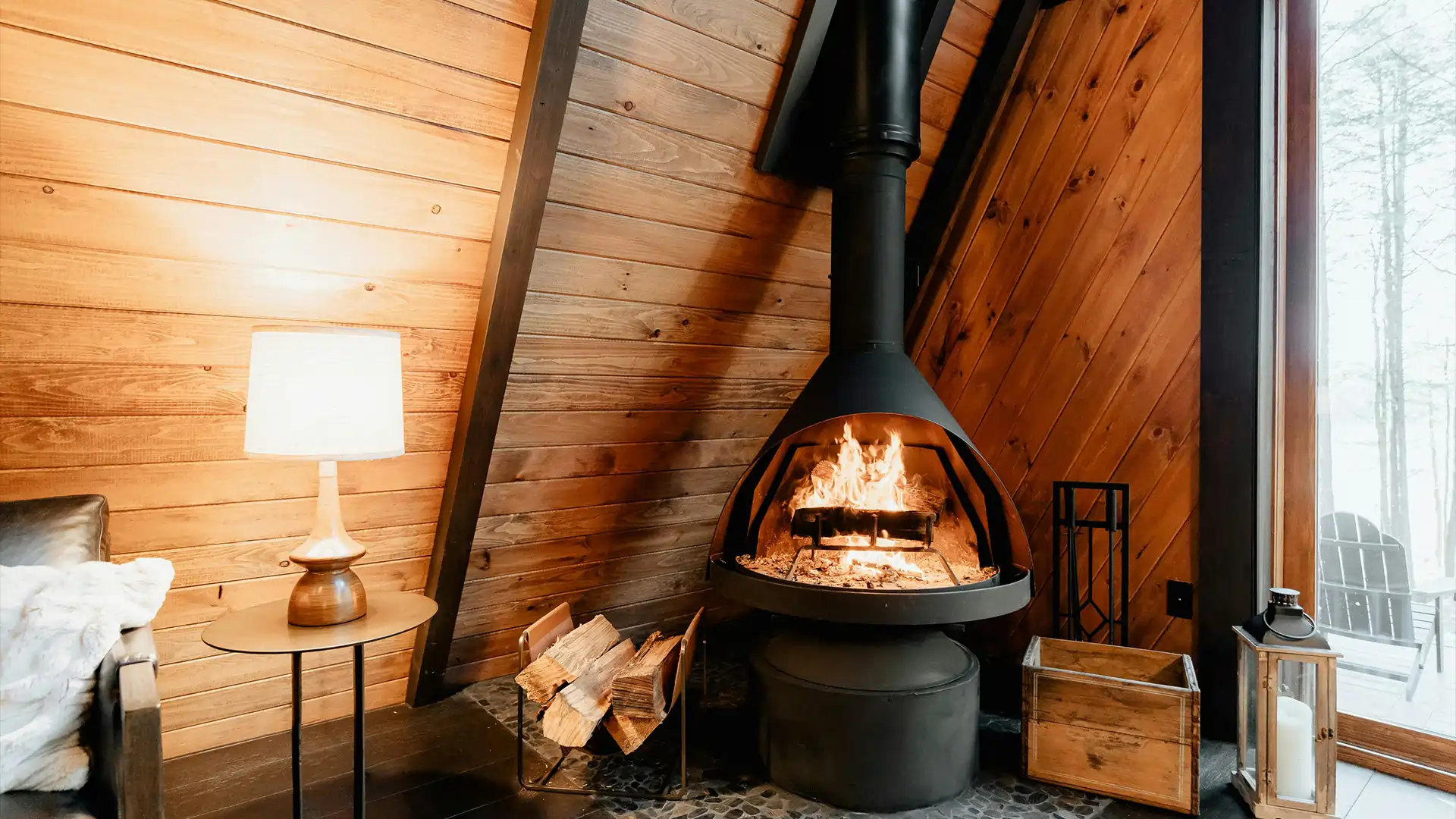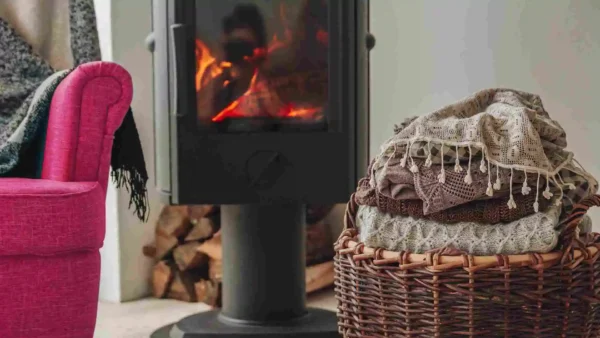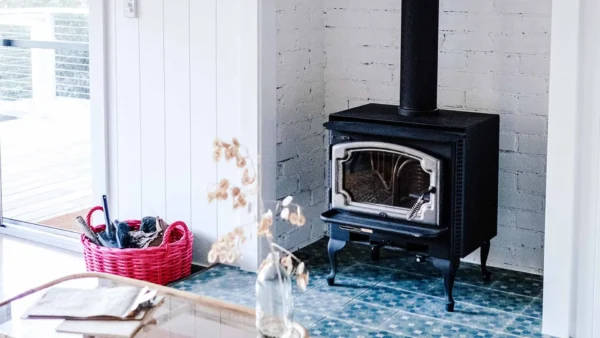If you’re one of over 760,000 Canadians who still heats their home with a wood burning or pellet stove, you should know that the presence of your stove could be raising your insurance rates. Wood burning stoves in Canada are usually inefficient as a primary heating source and are often older, potentially leading to dangerous circumstances with leaking fumes and confined fires.
Insuring a home with potentially dangerous features isn’t something a lot of companies like to do. Insurers that do provide coverage for homes with wood stoves are likely to perceive that wood stove as much a liability risk as, say, a swimming pool.
Wood burning stoves, or similar alternatives, raise doubts when it comes to insurability. Here’s why.
Insuring a home with a wood burning stove
One in 50 Canadian households own heating stoves, three-quarters of which are wood burning stoves. A misconception is that homes with wood burning or even pellet stoves will be uninsurable, but that’s not necessarily true. The presence of a wood burning or pellet stove will, however, likely lead to higher insurance premiums.
This is because both wood burning and pellet stoves increase the potential for fire and structural damage. Here are some hazards to consider with these stoves:
- Fire risk: As wood stoves involve direct flame, they can produce ash, smoke, and soot – all of which significantly elevate the risk of fire.
- Creosote build-up: Using wood stoves can cause soot or “creosote” buildup in your chimney, a substance which is both harmful and flammable. Unless you are adequately maintaining your chimney and stove, or installing a steel liner, your risk of chimney fire is much higher.
- Smoke accumulation: Unfortunately, one of the drawbacks of having a wood stove is that they tend to require more maintenance and care than electric or gas fireplaces. When you operate a wood stove, you create a draft to prevent the buildup of smoke and must burn kindling below larger wood stacks. This process can cause smoke accumulation within the home.
- Installation and maintenance: If your wood burning stove has been improperly installed or maintained, it could result in your insurance claim be denied.
Wood stoves are sometimes features of older homes, or you may have chosen to invest in one for the cozy ambiance, but unfortunately there are some risks that come with them. Always be upfront with your broker and insurer about the presence of a wood stove in your home. Not telling the truth may result in your claim being denied and could even risk your policy being voided altogether.
Can I still get insured with a wood burning stove at home?
Short answer: yes. Having a wood stove won’t automatically disqualify you for coverage, but there will be some pre-requisites you’ll need to fulfill first. Many insurers will require a woodstove or fireplace to pass a “Wood Energy Technology Transfer” (or WETT) inspection, plus they’ll ask about:
- If your wood stove or fireplace is a certified unit, like ULC, Warnock Hersey, CSA, or OTL
- The number of cords
- If it was professionally installed
- Proof of a professional clean once per year for wood stoves
- The age of the appliance
- Where the wood stove or fireplace is located
Without proper evidence of the above or a completed WETT inspection, your insurer may send an inspector to your home to inspect your stove and determine your eligibility for coverage.
We recommend having an inspection done every five years to ensure your wood burning stove is adequately maintained.
Which is cheaper for home insurance – a wood burning stove or a pellet stove?
Usually pellet stoves require less manual maintenance than wood stoves do and can be automated to add pellets and the thermostat may be used to control temperature more efficiently.

Overall, pellet stoves are considered safer due to their controlled burning process. They can use either a chimney or a vent, and there’s no need for an outdoor wood pile on your property with pellet stoves. They do, however, require an electrical power source.
Most insurers will view pellet stoves more favourably than wood stoves and while they’ll increase your premiums, it will likely be by less than 10%. Wood stoves, on the other hand, will increase your insurance by much more. Contact your insurance broker to get a deeper explanation of how either type of stove will end up impacting your insurance rates.
How much does a wood burning stove increase your insurance by?
Wood stoves will increase your insurance premiums by roughly 10%. You may be able to offset the increase by choosing a higher deductible, but of course we don’t always recommend this as it will mean paying a higher out-of-pocket amount in the event of a loss.
Clients should always hold on to maintenance receipts, as insurers may request proof of regular inspections and cleanings. And remember – although you might think not disclosing your wood burning stove or maintenance habits will save you money, it can result in your claims being denied or your policy being cancelled. Always be honest with your broker and insurer.
Different carriers and their heat source requirements
Here are some of the insurance companies Mitch works with and their primary and secondary wood stove heat source requirements:
| Carrier | Allow wood stove as primary? | Allow wood heat as secondary? | Requires photo evidence? | Required certifications? | Professional install/ WETT inspection required? |
|---|---|---|---|---|---|
| Aviva | No | Yes | Yes, questionnaire and photograph are required prior to binding for pellet stoves, wood stoves, space heaters, and fireplace inserts fuelled by wood | CSA, ULC, or Warnock-hersey approved | Must be professionally installed or safety inspected/approved with all recommendations to meet installation standards |
| CAA Insurance | No | Yes (although surcharge will apply for wood stoves, pellet stoves, and fireplace inserts) | Yes | CSA, ULCA, or WH approved | Solid fuel burning units must be installed, tested, inspected professionally, and cleaned annually. |
| Economical | No | Yes | If WETT inspected, no. If not WETT inspected, yes | CSA, ULC, or WH approved | Yes |
| Intact | No | Yes | Yes | CSA, UL, ULC, or WH approved | Yes |
| Pembridge | No | Yes | Yes | WETT inspection within past five years, certified by Warnock-Hersey, CSA, ULC, O-TL with label affixed to unit | Yes |
| Portage | No | No | Yes | ULC or CSA | Must be installed based on manufacturer specifications or CAN/CSA B365-M91 or CAN/CSA B366.1-M91 |
| SGI | Yes | Yes, under certain circumstances | Yes | Heating unit and components must be installed in accordance with manufacturer specifications | Yes |
| Commonwell Mutual | Forced-air wood fired furnaces will require a backup capable of automatically operating | Yes | Yes | CSA or ULC or WH | CSA or ULC or WH |
| Travelers | Yes (wood furnace must have backup source other than wood) | Yes | Yes, and must complete questionnaire with photo of wood burning unit for application | CSA, ULC, or WH | Yes – must be installed or inspected by WETT certified inspector |
| Travelers Essential | Approved models can be used, wood furnace must have a backup heat source other than wood | Yes | Yes | CSA, ULC, or WH | Yes |
| Wawanesa | Variable | Variable | Yes | CSA, ULC, or WH – PFS, Intertek, and Omni Test Labs are also accepted. | Must be either professionally installed or have a WETT inspection no older than 10 years |
| Data source: Mitch Insurance Brokers | |||||
Have questions about how wood stoves or other wood burning fuel sources impact your insurance? Give us a call and chat with one of our brokers today.
Looking for home insurance?
Speak with a Mitch Insurance broker today to get a quote on Ontario home insurance.
Call now
1-800-731-2228







